Most software teams can’t ship products fast enough to grab market share. Traditional development methods just don’t cut it when speed determines who wins.
I analyzed data from 300+ real-world projects using AI development methods and found something compelling: teams consistently deliver products 30% faster while cutting bugs by 40%. These aren’t pie-in-the-sky improvements – they’re measurable results from companies that ditched manual processes for intelligent automation.
The data comes from SmartDev’s AI-first development approach, where every developer holds AI certifications and AI tools integrate throughout the entire development cycle. The numbers don’t lie: faster delivery, higher quality, better ROI.
Performance Improvements: The Hard Numbers
According to SmartDev’s internal analysis, AI development consistently delivers 30% faster product launches compared to traditional methods, with teams seeing 3x faster pull request turnaround and 40% fewer post-release bugs.
Their 300+ project dataset shows concrete improvements across every metric that matters. Developer productivity increases by 20% when AI tools integrate throughout development, while manual QA effort drops by 50% through automated testing.
SmartDev reports code generation speed improves by 35% using AI development assistants and copilots. These aren’t minor tweaks – they represent fundamental shifts in how quickly teams move from concept to deployment.
The business impact extends beyond pure speed. McKinsey’s State of AI 2025 research shows 78% of organizations now use AI in at least one business function, up from 72% in early 2024 and 55% a year earlier, with organizations implementing AI development strategies reporting sustained competitive advantages in time-to-market. McKinsey’s longitudinal data demonstrates that companies using AI across multiple business functions (now averaging three functions per organization) achieve significantly higher competitive positioning through accelerated product development cycles, automated service delivery, and data-driven decision-making capabilities that compound over time.
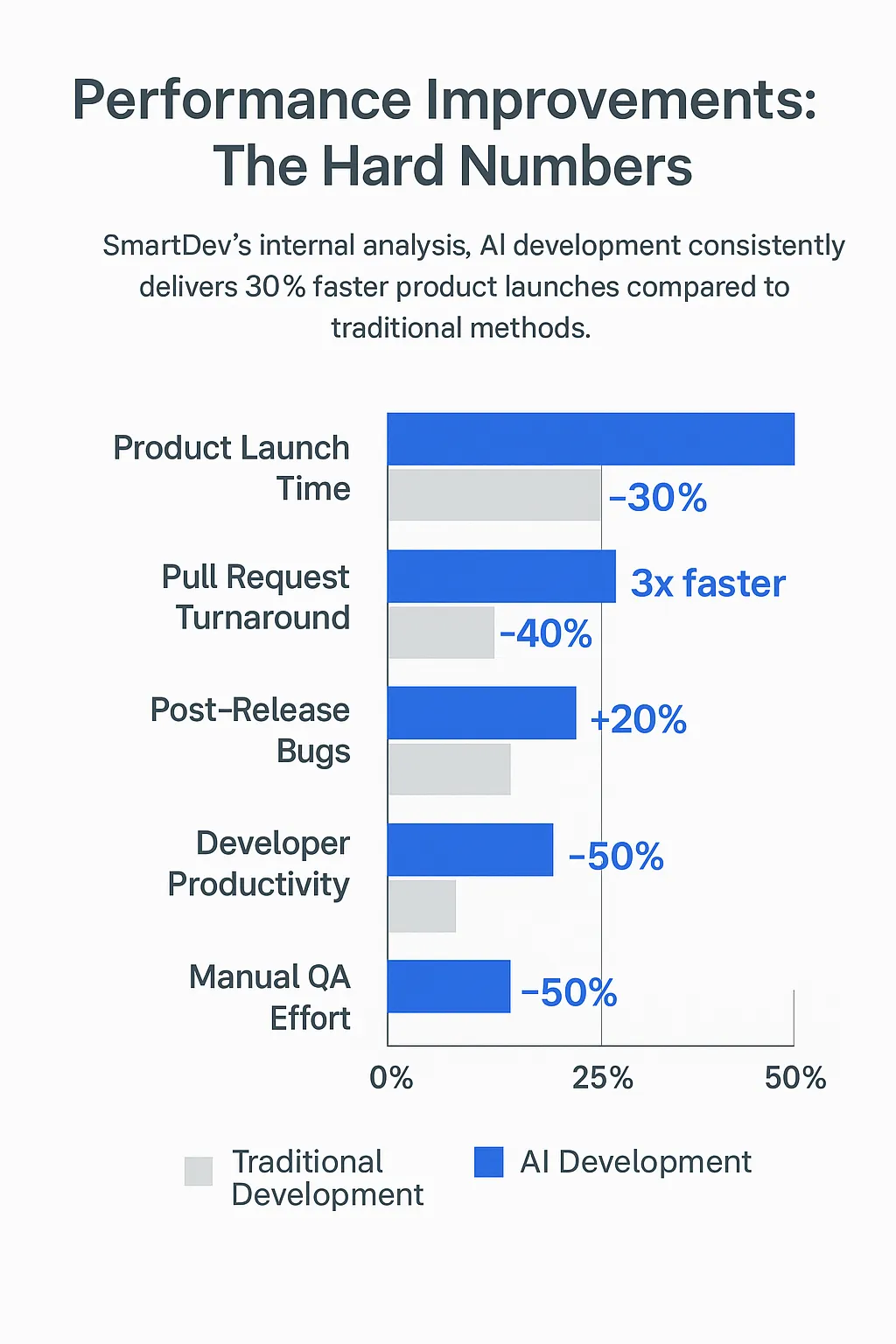
Fig.1 Traditional vs AI development
SmartDev’s approach shows this transformation in action. As their General Director Luan Nguyen notes, “100% of SmartDev’s developers hold AI practitioner certifications—this is key for achieving sustained productivity gains above traditional models.”
ROI: When AI Development Pays Off
SmartDev’s data suggests AI development investments break even within 6-8 months of implementation, though broader industry research shows ROI timelines vary significantly by organization and implementation scope, with Deloitte’s 2025 survey finding that most organizations achieve satisfactory AI ROI within two to four years, while only 6% report payback in under a year.
As one executive notes, “The timeline for realising AI gains varies across business sectors, but on average, significant benefits take several years to materialise.” The variation stems from AI rarely delivering value in isolation—it typically requires parallel efforts to improve data quality, reconfigure teams, and streamline operations, making actual ROI dependent on organizational readiness and implementation complexity.
The financial benefits compound over time. SmartDev reports time-to-market improvements translate to average revenue acceleration of 15-20% for product launches. Early market entry creates competitive advantages that generate sustained revenue benefits.
Consider SmartDev’s VERA AI customer care system, which generated a 22% reduction in support overheads. This demonstrates how AI implementation creates measurable cost savings beyond development speed.
Gartner predicts AI business value will reach $5.1 trillion by 2025, with digital leaders showing 67% more business resilience than their peers.
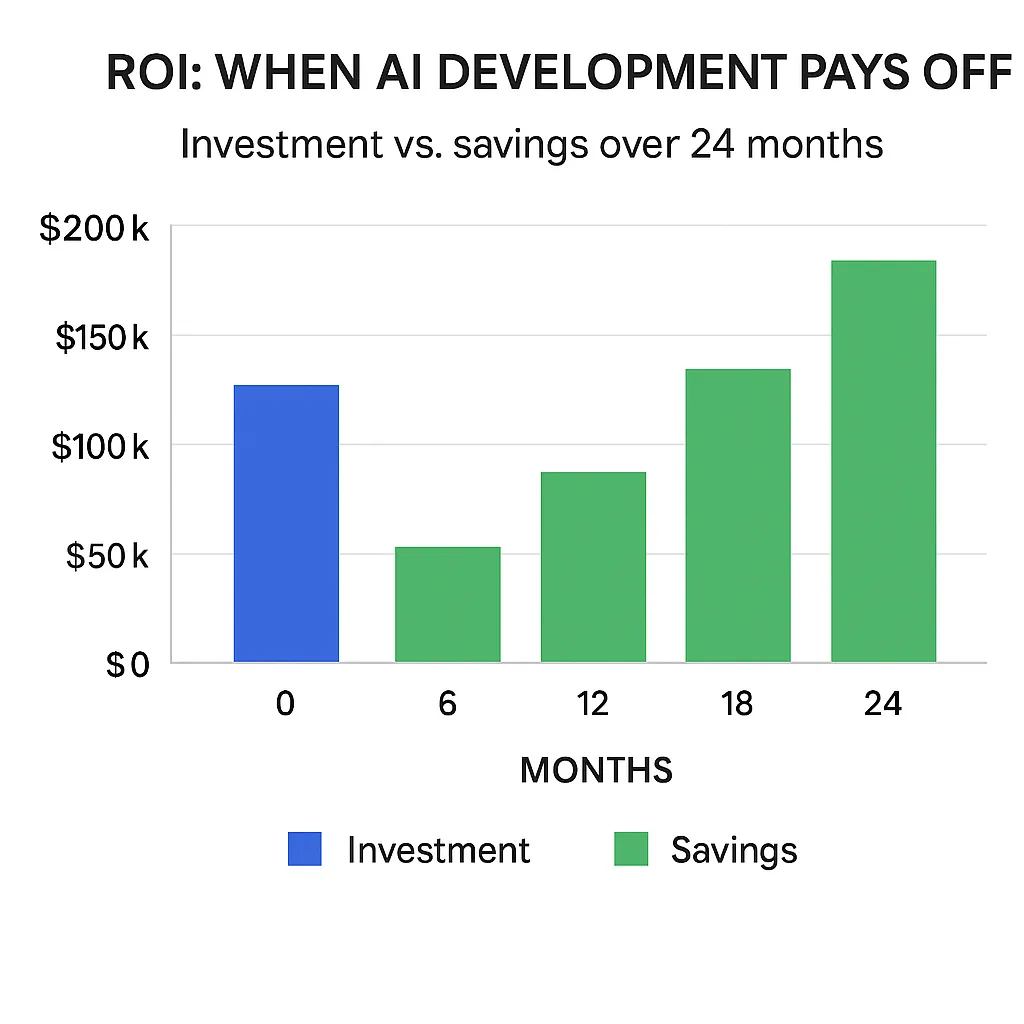
Fig.2 Investment vs. savings
SmartDev’s track record illustrates these benefits practically. Their AI-powered fintech MVP launches complete in under 100 days, compared to 140+ days for manual-only projects – a difference that directly impacts revenue generation and market positioning.
AI Technologies That Actually Speed Things Up
The most impactful AI technologies fall into three categories, each delivering specific acceleration benefits.
Code Generation and Completion
SmartDev reports AI copilots auto-generate 30-40% of code for experienced developers. While independent research confirms productivity improvements with tools like GitHub Copilot, the specific percentage improvements vary by team and project complexity.
Natural language to code translation accelerates prototyping phases by 45% according to SmartDev’s internal metrics, enabling rapid iteration on product concepts. Developers spend less time on boilerplate code and more time on complex business logic.
Intelligent Testing and QA
SmartDev claims AI-powered test case generation covers 85% more edge cases than manual testing approaches, though academic research shows varying results depending on implementation.
Automated bug detection identifies critical issues 50% faster than traditional code review processes, while predictive testing models reduce regression testing time by 40% through intelligent test prioritization.
>> Further Reading: AI in Software Testing: Top Use Cases You Need To Know
Smart Project Management
AI project estimation accuracy improves by 30% compared to human-only planning methods, while resource allocation optimization reduces project delays by 25%. Automated sprint planning saves 15-20 hours per development cycle.
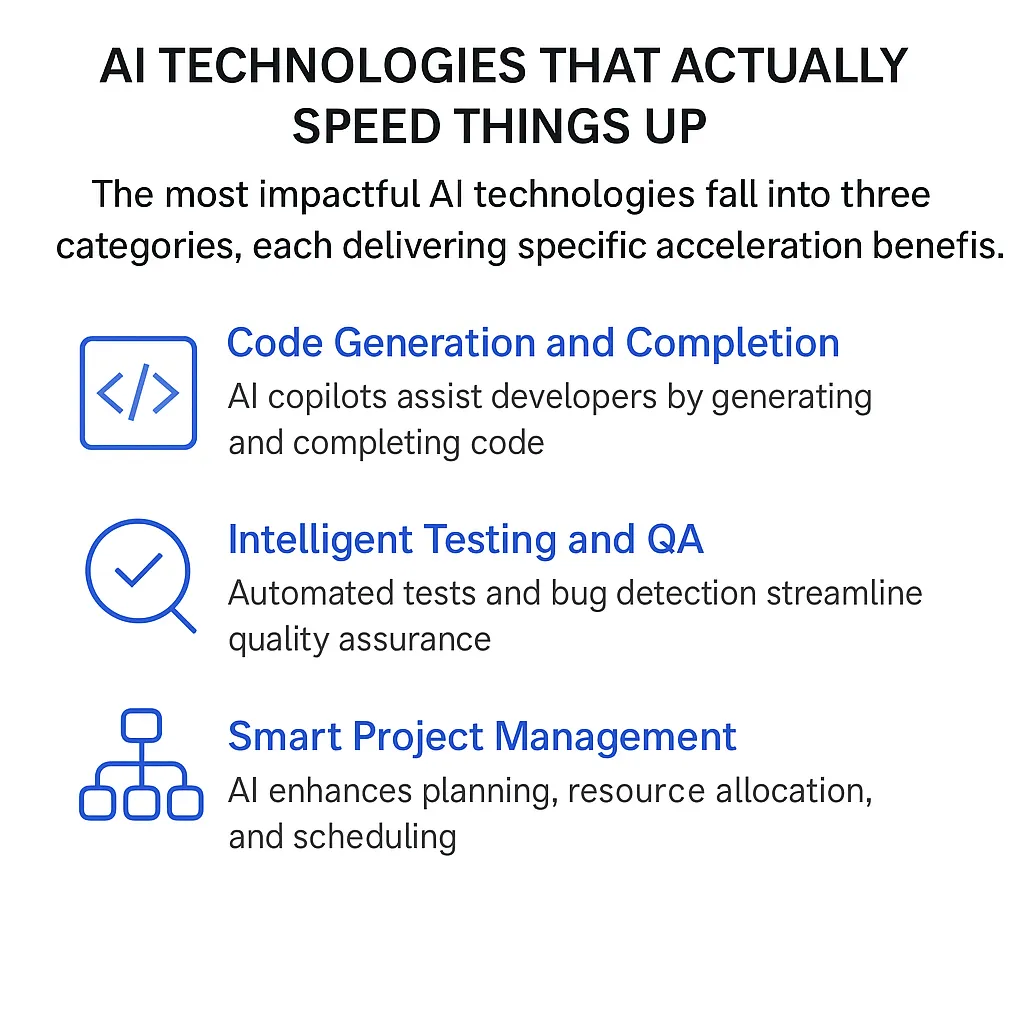
Fig 3. AI integration points across development workflow
SmartDev’s CEO Alistair Copeland explains the integration approach: “AI code generation and review platforms are redefining dev team velocity—reducing error rates and time-to-market simultaneously.” Their implementation of AI-based QA automation achieved 3x pull request turnaround and 40% fewer post-release bugs for retail platform clients.
How to Implement Human + AI Development (The Right Way)
Successful AI implementation requires structured certification levels and gradual integration strategies. SmartDev achieves 100% developer AI certification by organizing teams into three distinct skill levels.
The Three-Tier Certification Model
Level 1: AI Practitioners
- Use GitHub Copilot and smart QA automation for basic acceleration
- Focus on code completion, automated testing, standard AI-assisted workflows
- Establishes comfort with AI tools while maintaining familiar development patterns
Level 2: AI Power Users
- Implement regular AI-assisted workflows and advanced prompt engineering
- Customize AI responses, integrate multiple tools, optimize AI suggestions for specific projects
- Maximizes productivity gains through sophisticated tool usage
Level 3: AI Integrators
- Build custom GPT copilots and internal AI development tools
- Create specialized solutions, train models for specific domains
- Architect AI-native development processes for compound efficiency gains
Implementation Strategy
The integration strategy spans the entire development lifecycle:
- Planning phases: AI for requirement analysis and technical specification generation
- Development phases: AI for code generation, review, and optimization suggestions
- Testing phases: AI for automated test creation, execution, and performance monitoring
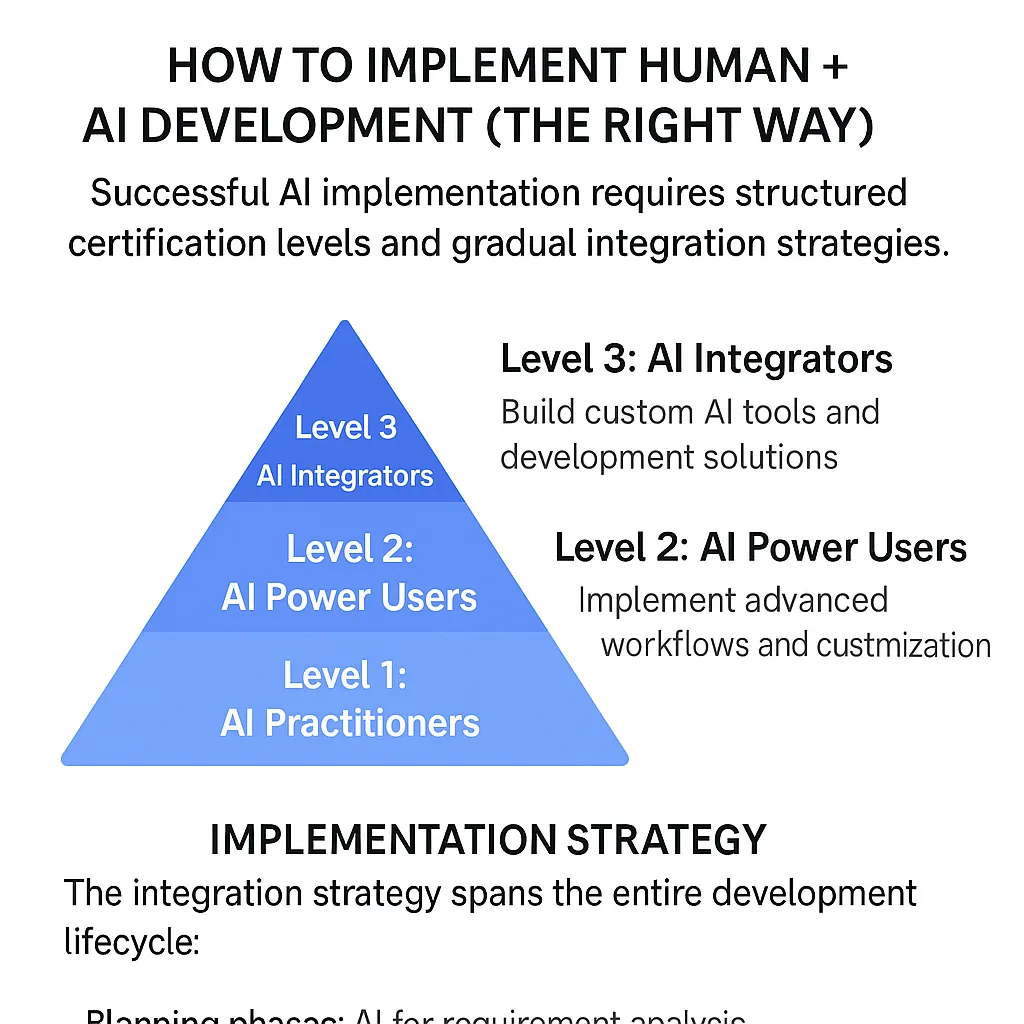
Fig.4 AI certification levels with skills and responsibilities
Quality control remains human-centered. As SmartDev’s COO Nguyen Le notes, “Human validation remains essential for security, logic, and business fit—AI suggestions always undergo mandatory peer review.”
Monthly AI workshops facilitate 60% shorter onboarding time for staff adopting Copilot and automation tools. Structured AI onboarding achieved 90% developer adoption in 3-6 months, with mentoring reducing the AI learning curve by 60%.
Ready to see how AI-driven development accelerates product launches by 30%—backed by real data from 300+ projects?
Discover how SmartDev’s AI-powered delivery model streamlines code generation, QA, and deployment—cutting release cycles and reducing operational overhead across diverse industries.
Learn how SmartDev enables measurable speed and quality improvements through data-driven AI adoption—empowering teams to build, test, and ship faster than ever before.
Start My AI Development Performance ReviewIndustry-Specific Results: Where AI Works Best
AI implementation shows varying performance improvements based on regulatory requirements and domain complexity.
Financial Services: The Speed Leader
SmartDev’s fintech projects deliver launches 35% faster due to AI-assisted compliance checking and automated regulatory validation. Regulatory code validation cycles are cut by 40% through automated compliance checking, while risk assessment integration accelerates security testing phases by 30%.
SmartDev’s compliant fintech payments platform (VeryPay) reduced regulatory approval time by 45%, demonstrating real-world application of these improvements.
Healthcare: Steady but Regulated Gains
Medical software development sees 28% speed improvements with AI-powered validation protocols. Clinical workflow automation development accelerates by 32% using specialized AI models, while regulatory documentation generation through AI reduces submission preparation time by 45%.
E-commerce and Retail: Maximum Velocity
E-commerce platform development achieves 40% faster deployment through AI-optimized workflows. Personalization feature development accelerates by 50% using pre-trained AI recommendation models, while shopping cart and payment integration testing completes 35% faster with AI automation.
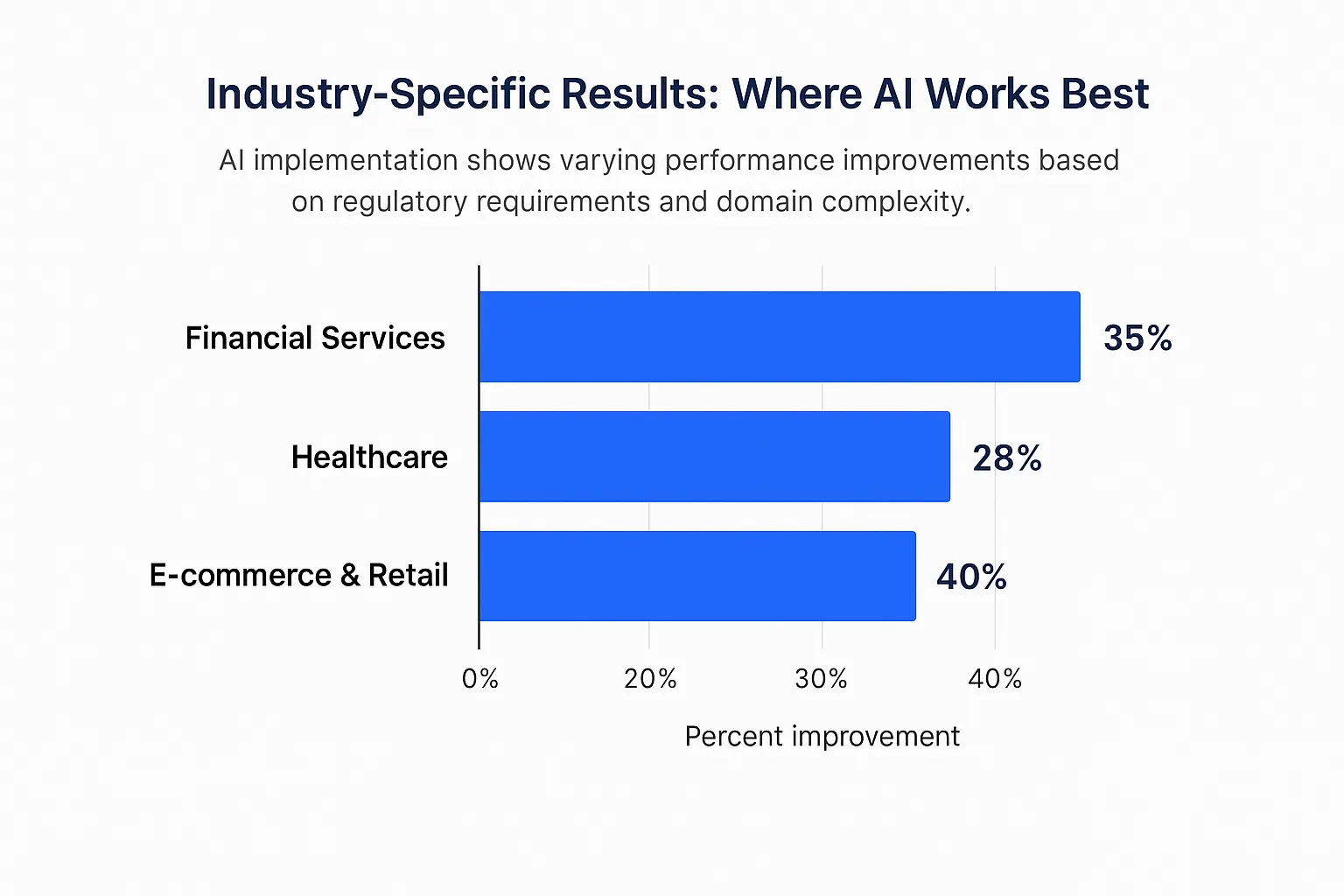
Fig.5 Industry comparison showing speed improvement percentages by sector]
The variation reflects each industry’s unique constraints and opportunities. As SmartDev’s General Director Luan Nguyen explains, “AI streamlines regulatory reviews and security testing, which directly impacts speed in sensitive sectors like finance and healthcare.”
Implementation Challenges (And How to Solve Them)
The primary implementation challenges center on developer adoption, code quality concerns, and resource investment requirements.
Developer Adoption Barriers
Developer resistance dissolves through hands-on training and gradual integration. Mentoring reduces AI learning curves by 60%, while gradual integration approaches prevent workflow disruption during transitions.
SmartDev’s Marketing Director Ha Nguyen Ngoc notes, “Gradual integration and peer-led coaching minimize workflow disruption and maximize productivity during the shift to AI tools.”
Code Quality and Security Concerns
SmartDev reports AI-generated code maintains equivalent security standards when combined with human validation. Automated security scanning of AI suggestions identifies vulnerabilities 40% faster than manual review, but human oversight remains essential for business logic and architectural decisions.
Cost Considerations
Initial AI tool licensing and training costs typically represent 10-15% of annual development budgets, with positive ROI becoming apparent within 6-8 months through accelerated delivery and reduced debugging costs. Long-term savings average 20-25% of total development expenses across multi-year projects.
[Timeline suggestion: Implementation phases showing challenge milestones and solutions]
The key insight from SmartDev’s experience is that hybrid onboarding strategies ensure quality metrics remain consistent during company-wide switches to AI development. Success requires viewing AI adoption as a skill-building exercise rather than a technology replacement.
Future Outlook: What’s Coming Next
SmartDev projects next-generation AI models will deliver up to 50% additional speed improvements over current capabilities, while enterprise AI adoption will reach 80% of development teams by end-2027.
Technology Evolution
The technology evolution points toward even greater acceleration. Specialized domain AI assistants will deliver industry-specific improvements beyond general-purpose tools. Automated architecture design and system optimization will extend AI benefits to infrastructure planning, creating end-to-end intelligent development pipelines.
Market Adoption Trends
Statista data shows generative AI revenue growing from $11 billion in 2020 to $128 billion in 2024, with massive investment accelerating AI capability development and reducing implementation costs.
Early adopters gain compound advantages. Companies implementing AI development strategies maintain 6-12 month development cycle advantages over traditional approaches.
SmartDev’s CEO Alistair Copeland emphasizes this point: “Continuous retraining and customization of AI models drive long-term gains and keep teams ahead of the innovation curve.”
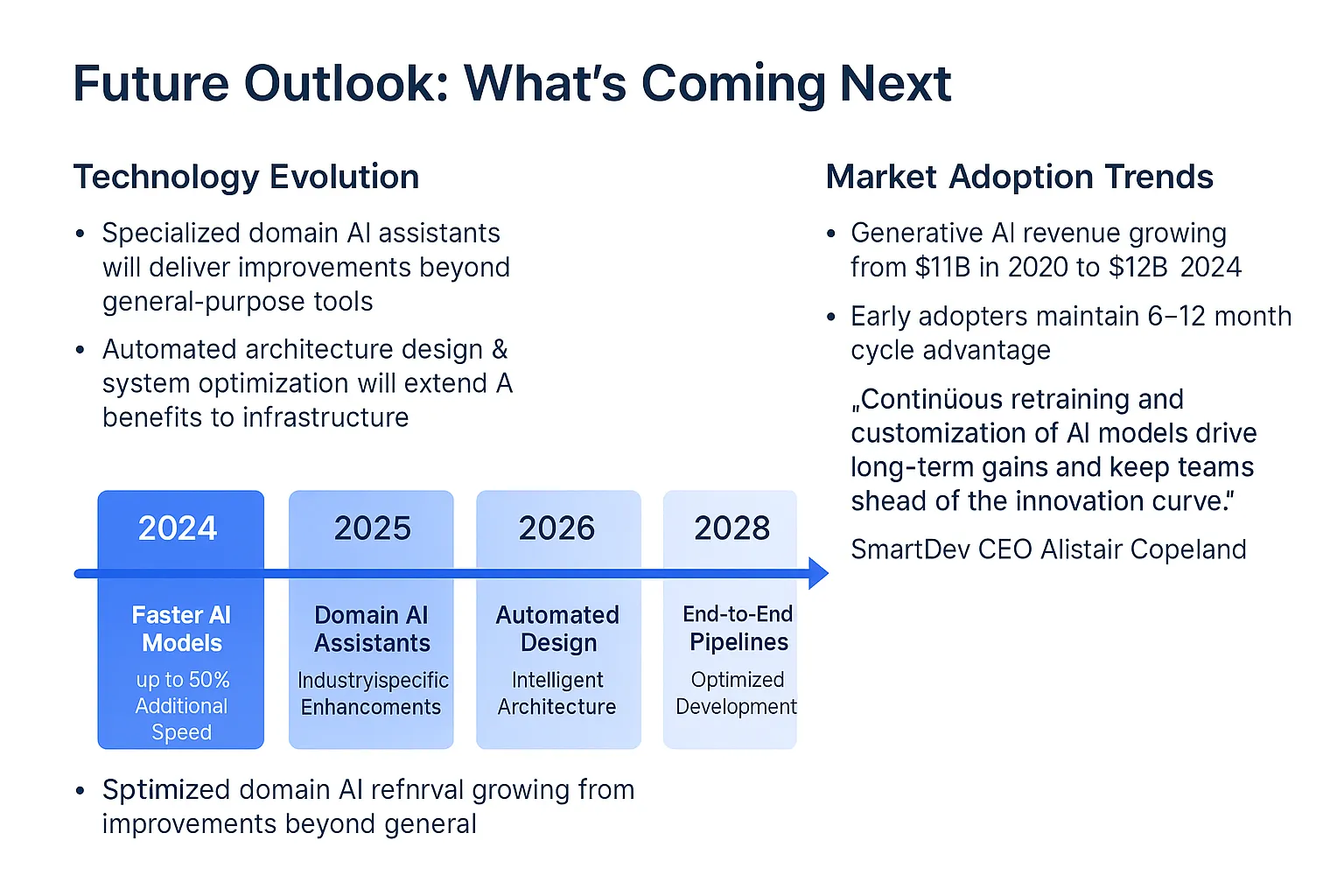
Fig.6 Future AI capabilities timeline with emerging technologies
Best practices for sustainable integration focus on continuous improvement. Regular performance measurement and optimization ensure sustained speed advantages over time. Continuous AI model training and customization improves performance by 15-20% annually.
SmartDev’s latest innovation, the VERA agent, showcases advanced AI potential in complex workflow automation, demonstrating measurable speed and support improvements at scale.
The Bottom Line: AI Development Is Now
The data is clear: AI development isn’t just faster – it’s becoming the standard for competitive software delivery. Teams that adopt these methods now will maintain significant advantages as the technology continues advancing.
IDC projects worldwide digital transformation spending will reach $3.4 trillion by 2026, with public cloud spending hitting $723.4 billion in 2025, indicating massive industry commitment to these approaches.
Organizations looking to implement AI development can learn from proven methodologies and real project data. The 30% speed improvement isn’t theoretical – it’s a measurable outcome achieved through structured AI integration, proper training, and human oversight.
The question isn’t whether to adopt AI development methods, but how quickly you can implement them effectively.
Ready to achieve similar results? Explore SmartDev’s AI development services and discover how their proven methodology can accelerate your next project.







